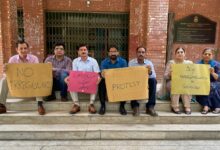Experts ask for aligning international cooperation for healthcare
ISLAMABAD: The multilateral and bilateral cooperation on infrastructure development in the post Covid-19 scenario must include healthcare as a cross cutting sector while implementing all the future-oriented projects. The world powers therefore need to join hands for a shared future instead of narrow nationalistic approaches.
The development experts with diverse areas of expertise shared these views with the audience at online policy dialogue titled ‘Belt and Road Initiative (BRI) as a Health Silk Route’ organized by the Sustainable Development Policy Institute (SDPI) here on Tuesday.
Mr Haroon Sharif, former Chairman Board of Investment (BOI) Pakistan, said that the global leadership deficit is the major challenge we seen after the emergence of Covid-19. Chine therefore, despite the mounting internal challenges, has to step up and lead the global efforts to mitigate the crisis.
He said that a resource vacuum is just looming on our heads and the world has become more fragmented then it has been ever before. This scenario demands China to reshape its existing development initiatives such as BRI and CPEC with more focused on the human development and besides, a healthcare economic zone is need of the hour to respond to ever increasing demand and shortage of the supplies in the healthcare sector.
Dr Abid Qaiyum Suleri, Executive Director SDPI, said that it’s time to explore the new dimensions of the global and regional cooperation and health as well as knowledge economy must be the top considerations of development endeavors.
“We must appreciate Chinese leadership for taking timely and rightly measures to contain the pandemic successfully in China and now they world is looking forward to get benefitted from the treatment protocols applied by China to respond the deadly virus.” Dr Suleri added.
Mr Koh King Kee, President Center for New Inclusive Asia, Malaysia, opined that the working together is the only way forward for the world to respond to the crisis resulted by the Covid-19. He said the world economies are getting collapsed and hence, food security and agriculture are the areas that demand greater cooperation at every level.
Ms. Tang Bei, from Shanghai International Studies University, China, viewed that due to growing internal challenges, China may not initiate the new projects but the existing commitment such as CPEC should be focused. She said that the enhanced cooperation in healthcare sector would be important as future dimension and China is already lending support to countries in every parts of the world to cope with the ongoing crisis.
Mr Hussein Askary, South-West Asia Coordinator for the International Schiller Institute, Sweden, termed the infrastructure development as the most crucial aspect of cooperation and said that BRI and CPEC have special significance in improving the healthcare facilities in different countries linked with these initiatives.
Shakeel Ramay, of SDPI, earlier presented the overview of BRI with its special significance to healthcare sector and said that we need to look into emerging global needs in the aftermath of Covid-19.
Mr. Muhammad Mudassir Tipu, Director General China Foreign Office of Pakistan, Dr Zahid Ahmed, Research Fellow at Deakin University, Australia and Ms Ayesha Alyas, of SDPI also covered the diverse aspects of the topic and highlighted the importance of infrastructure development aligned with the healthcare sector needs in the post Covid-19 scenario.



